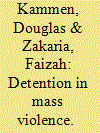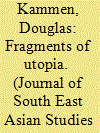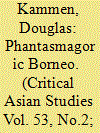|
|
|
Sort Order |
|
|
|
Items / Page
|
|
|
|
|
|
|
| Srl | Item |
| 1 |
ID:
115034


|
|
|
|
|
| Publication |
2012.
|
| Summary/Abstract |
This article examines the formulation and implementation of Indonesian Army policy regarding the detention of communists and other leftists in Indonesia from 1965 to 1968. The article highlights the relationship between the two primary forms of violence-killings and detentions-in the aftermath of the failed September 30th Movement. Placing detentions at the center of analysis changes our understanding of the mass violence in several ways. First, it demonstrates that the policy to detain and "classify" large numbers of suspected communists helped to fuel the attack on the political Left. Second, it shifts the locus of analysis away from identification of the perpetrators and victims and instead seeks to highlight the processes that enabled and shaped the violence. Third, by examining the ratio between the estimated number of individuals killed and the number of individuals who remained alive in detention at a particular point in time, the article proposes a new explanation for variation in the scale and intensity of mass violence across Indonesia. This analysis encourages comparison across a much wider range of cases within Indonesia than has previously been attempted and provides a framework for future work on the mass violence in Indonesia as well as in other cases in which mass detentions or forced relocations preceded mass killings.
|
|
|
|
|
|
|
|
|
|
|
|
|
|
|
|
| 2 |
ID:
090299


|
|
|
|
|
| Publication |
2009.
|
| Summary/Abstract |
Six months after the historic August 1999 referendum in which the people of East Timor voted to reject Indonesia's offer of broad autonomy, the newly appointed chief of the United Nations Transitional Administration in East Timor, Sérgio Vieira de Mello, commented to CNN on the enormous challenge of setting the territory on the road to independence: 'It is a test case, therefore it is even a laboratory case where we can transform utopia into reality. But I think we can try and get it right in the case of Timor.' After 24 years of brutal military occupation, the suggestion that East Timor was to be a laboratory case for the United Nations might have seemed insulting, the notion of utopia absurd. Hundreds of thousands of people were without housing. Basic infrastructure lay in ruins. Commodities were scarce and those goods available were sold at grossly inflated prices. Eleven thousand foreign troops had arrived to restore security. Tens of thousands of refugees were still living in squalid camps across the border in Indonesian West Timor, many against their will. Nevertheless, Vieira de Mello's statement neatly captured the twin aspirations of the time - the independence long-dreamed of by East Timorese and the opportunity for the United Nations literally to build a state from the ground up. In the same CNN report, East Timorese Nobel Laureate José Ramos-Horta emphasised precisely this point: 'This is the first instance in the history of the UN that the UN has managed completely an entire country; and they have a [Timorese pro-independence] movement that is very cooperative, they have an exceptional people that's cooperating with them, so they cannot fail. They are condemned to succeed because failure would be disastrous for the credibility of the UN, so they simply cannot afford to fail.' Utopia, it seems, had become a necessity.
|
|
|
|
|
|
|
|
|
|
|
|
|
|
|
|
| 3 |
ID:
178402


|
|
|
|
|
| Summary/Abstract |
The island of Borneo has been the subject of starkly different portrayals. On the one hand, the devastation of the island’s great rainforests, choking haze from fires set to clear land for oil palm plantations, and open-pit coal mining have prompted visions of environmental collapse. On the other hand, Indonesian President Joko Widodo’s 2019 announcement that the national capital will be moved from Jakarta to East Kalimantan prompted utopian dreams that massive investment and technology will create a glorious future. This article explores how these competing portrayals of Borneo emerged historically through European and American fiction – including utopian novels, lost race stories, and pulp and science fiction – and are reflected and reproduced in Indonesian political thinking. The final section examines how these long-standing ideas about Borneo as the site of the fantastic and the phantasmagoric have colored media reporting and commentary about President Widodo’s planned new capital in East Kalimantan.
|
|
|
|
|
|
|
|
|
|
|
|
|
|
|
|
| 4 |
ID:
187172


|
|
|
|
|
| Summary/Abstract |
Two decades since its violent birth, Southeast Asia’s newest nation is stable and at peace with its neighbors, but domineering elder statesmen and reliance on oil revenue raise concerns.
|
|
|
|
|
|
|
|
|
|
|
|
|
|
|
|
|
|
|
|
|